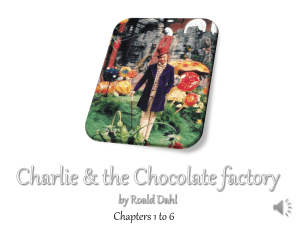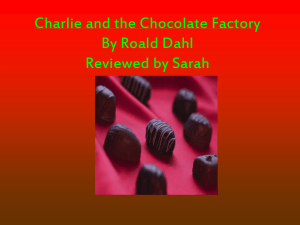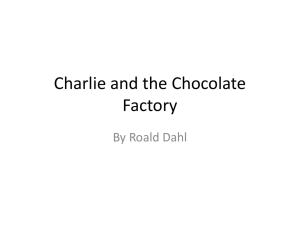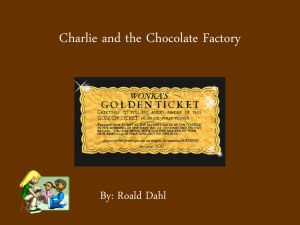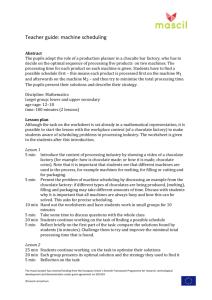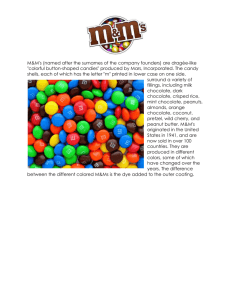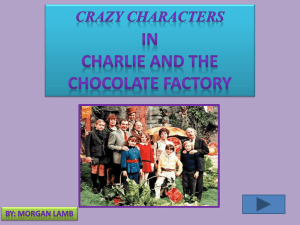Charlie and the Chocolate Factory essay - Weebly
advertisement
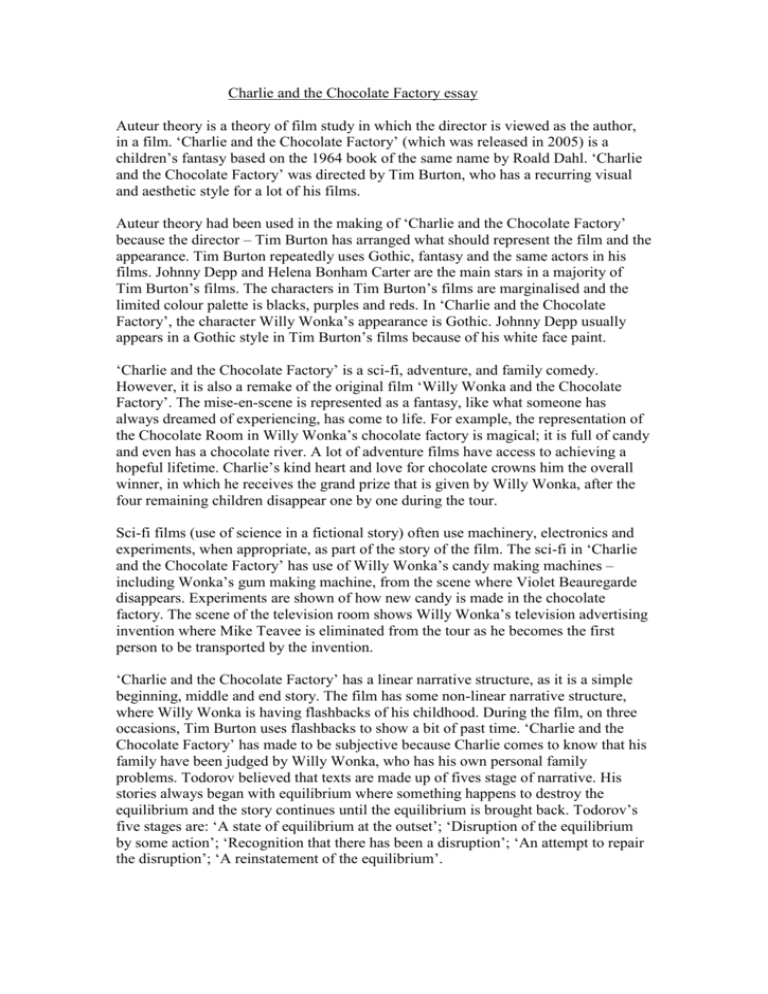
Charlie and the Chocolate Factory essay Auteur theory is a theory of film study in which the director is viewed as the author, in a film. ‘Charlie and the Chocolate Factory’ (which was released in 2005) is a children’s fantasy based on the 1964 book of the same name by Roald Dahl. ‘Charlie and the Chocolate Factory’ was directed by Tim Burton, who has a recurring visual and aesthetic style for a lot of his films. Auteur theory had been used in the making of ‘Charlie and the Chocolate Factory’ because the director – Tim Burton has arranged what should represent the film and the appearance. Tim Burton repeatedly uses Gothic, fantasy and the same actors in his films. Johnny Depp and Helena Bonham Carter are the main stars in a majority of Tim Burton’s films. The characters in Tim Burton’s films are marginalised and the limited colour palette is blacks, purples and reds. In ‘Charlie and the Chocolate Factory’, the character Willy Wonka’s appearance is Gothic. Johnny Depp usually appears in a Gothic style in Tim Burton’s films because of his white face paint. ‘Charlie and the Chocolate Factory’ is a sci-fi, adventure, and family comedy. However, it is also a remake of the original film ‘Willy Wonka and the Chocolate Factory’. The mise-en-scene is represented as a fantasy, like what someone has always dreamed of experiencing, has come to life. For example, the representation of the Chocolate Room in Willy Wonka’s chocolate factory is magical; it is full of candy and even has a chocolate river. A lot of adventure films have access to achieving a hopeful lifetime. Charlie’s kind heart and love for chocolate crowns him the overall winner, in which he receives the grand prize that is given by Willy Wonka, after the four remaining children disappear one by one during the tour. Sci-fi films (use of science in a fictional story) often use machinery, electronics and experiments, when appropriate, as part of the story of the film. The sci-fi in ‘Charlie and the Chocolate Factory’ has use of Willy Wonka’s candy making machines – including Wonka’s gum making machine, from the scene where Violet Beauregarde disappears. Experiments are shown of how new candy is made in the chocolate factory. The scene of the television room shows Willy Wonka’s television advertising invention where Mike Teavee is eliminated from the tour as he becomes the first person to be transported by the invention. ‘Charlie and the Chocolate Factory’ has a linear narrative structure, as it is a simple beginning, middle and end story. The film has some non-linear narrative structure, where Willy Wonka is having flashbacks of his childhood. During the film, on three occasions, Tim Burton uses flashbacks to show a bit of past time. ‘Charlie and the Chocolate Factory’ has made to be subjective because Charlie comes to know that his family have been judged by Willy Wonka, who has his own personal family problems. Todorov believed that texts are made up of fives stage of narrative. His stories always began with equilibrium where something happens to destroy the equilibrium and the story continues until the equilibrium is brought back. Todorov’s five stages are: ‘A state of equilibrium at the outset’; ‘Disruption of the equilibrium by some action’; ‘Recognition that there has been a disruption’; ‘An attempt to repair the disruption’; ‘A reinstatement of the equilibrium’. In ‘Charlie and the Chocolate Factory’, the state of equilibrium at the outset is the introduction. The disruption of the equilibrium by some action is when the announcements of the Golden Tickets starts. The recognition that there has been a disruption is when Charlie starts looking for a Golden Ticket himself. The attempt to repair the disruption is the tour around the Chocolate Factory. The reinstatement of the equilibrium is at the end of the film where Charlie has won the Chocolate Factory. Vladimir Propp was a Russian narrative theorist that analysed over 100 Folk Tales. Propp used ‘the Russian Fairytale’ method, separated each fairytale into sections and analysed seven character types. Vladimir Propp’s character theories are ‘the Villain’ (bad guy/girl who’s against the hero); ‘the Donor’ (like a mentor to the hero e.g. fairy godmother); ‘the Helper’ (helps the hero to find success); ‘the Princess’ (who the hero marries); ‘her Father’ (normally dies in the story or before); ‘the Dispatcher’ (character that sends the hero off); ‘The hero’ (takes advice from the donor and marries the princess). In ‘Charlie and the Chocolate Factory’, Charlie is the Hero because he earns his prize which is the Chocolate Factory. The Villains are the other four children because they do not help Charlie to succeed as they want to win- however, they cause themselves trouble. The Donor is Grandpa Joe because he’s like a mentor to Charlie. The Helper is Willy Wonka because he helps Charlie to find success. The Chocolate Factory is in role of the Princess as it is what Charlie loves. The Golden Ticket is the Dispatcher as it is what sends Charlie to the Chocolate Factory. Laura Mulvey is a theorist for the male gaze. The male gaze is how men see women. The theory that’s known as the feminist film theory observes the representation of female character in film and identifies ideological change. To describe what women are like, women are referred as being obsessed with men. Some people might have an opinion that women think they’re perfect in their own way. Others may have stronger opinions that women are ditsy or thick because of the person they are and the gender. To describe what women do, women are known to work. Some people might think that women complain so much. Others may think that well actually women do much more than argue or fight because they look after their other half and their children. Feminist theory for Charlie and the Chocolate Factory: In Charlie and the Chocolate Factory most women are the mums, wives or grandmas. As Charlie and the Chocolate Factory is a family film there are not really any women linked to the male gaze. Mrs Bucket spends every day looking after the family. Grandma Josephine and Grandma Georgina don’t get up having remained bedridden for a long time. Second Golden Ticket finder Veruca Salt is spoilt, manipulative and rotten. For example, Veruca doesn’t find the Golden Ticket, as she gets her dad to make his workers find it for her. Third Golden Ticket finder Violet Beauregard is arrogant and selfish. For example, when Violet finds the Golden Ticket she brags on about how she’s the one that’s going to win the special prize because she is a champion. Mrs Gloop thinks she knows what will happen and when it does she knows she’s right. One example is when Augustus finds the ticket; she just knew he would, as he loves eating so much. Mrs Beauregard is encouraging because she supports Violet within her selfishness. Gaby Laney
